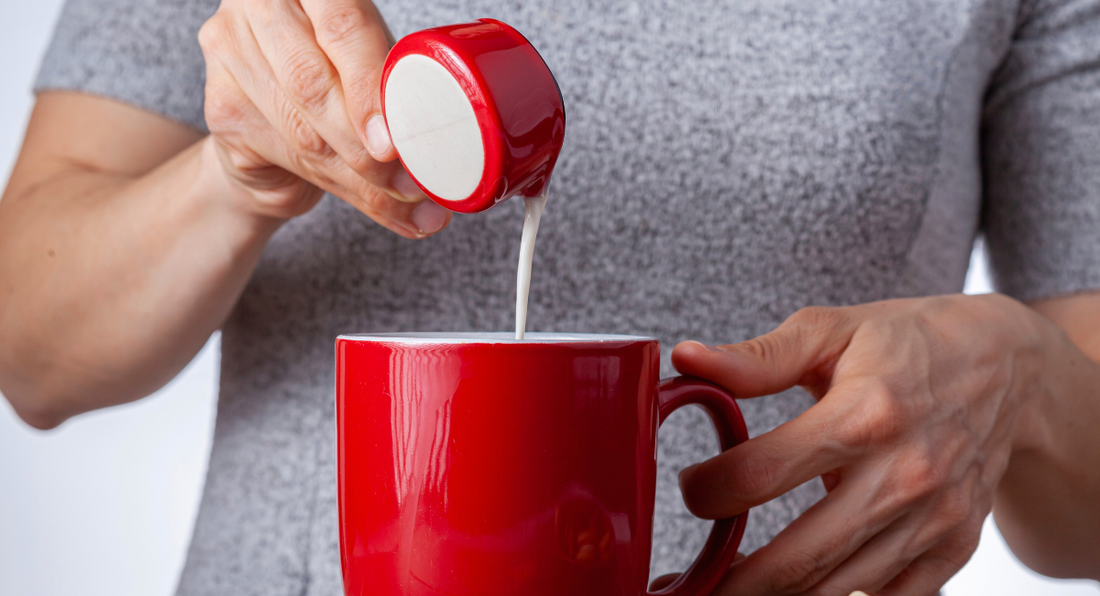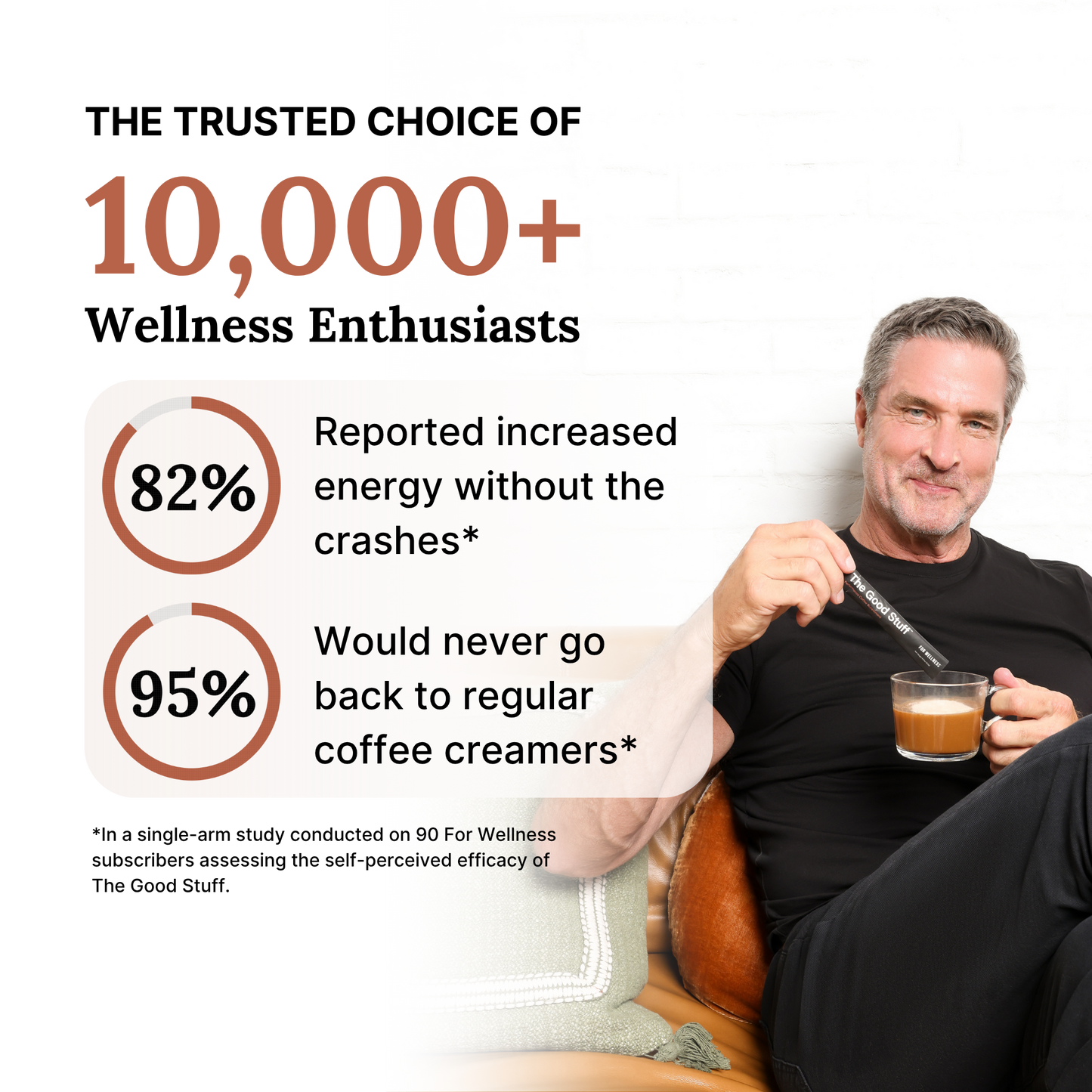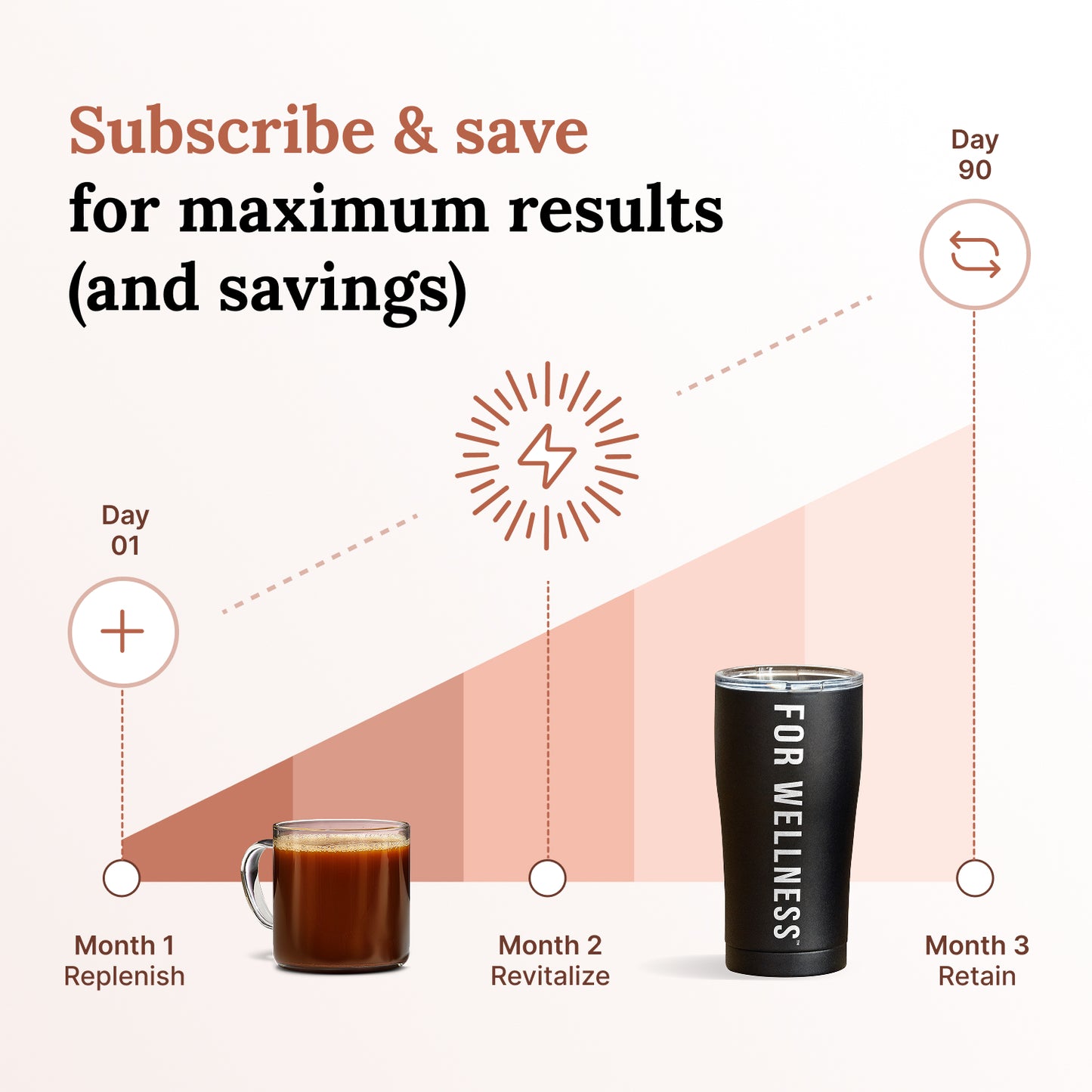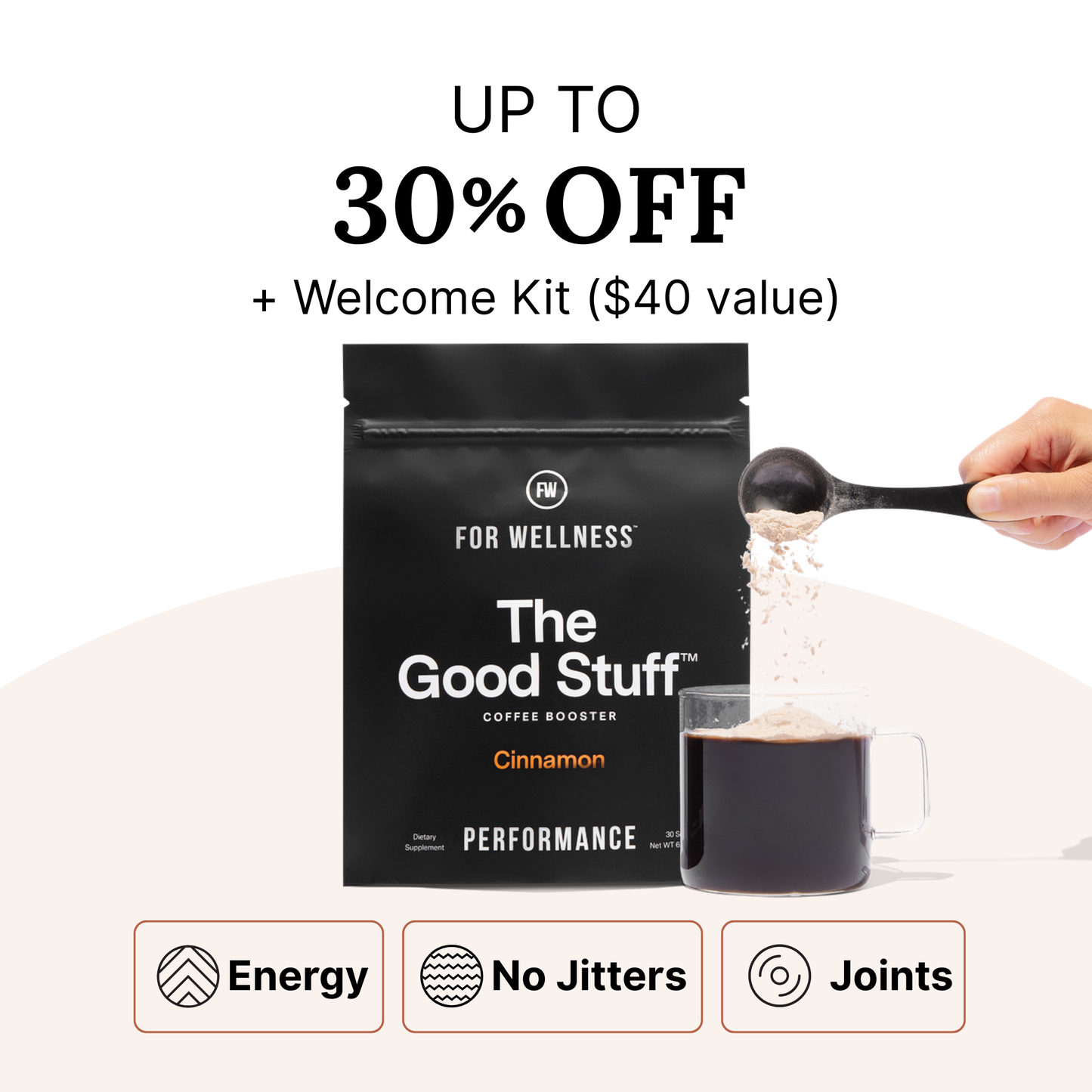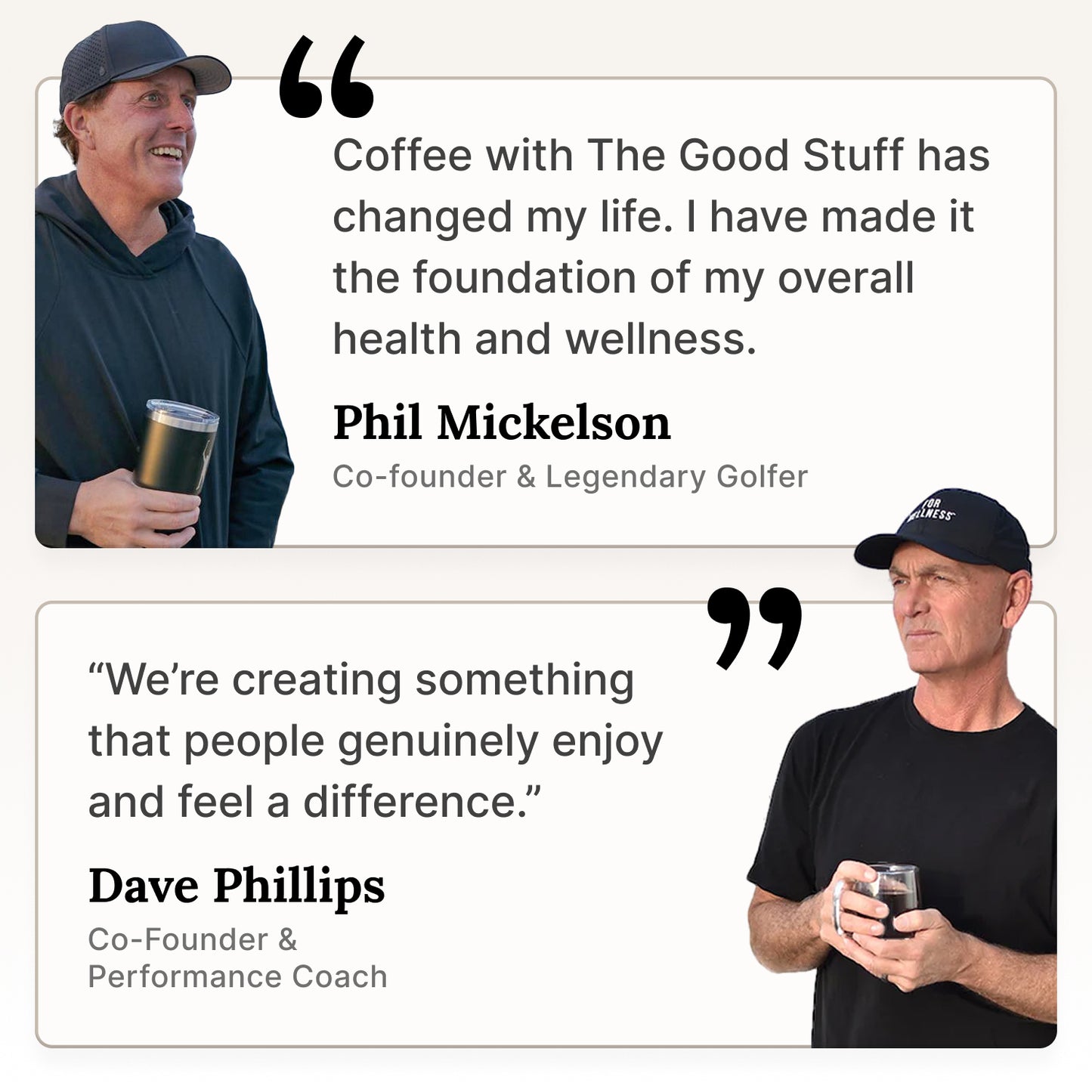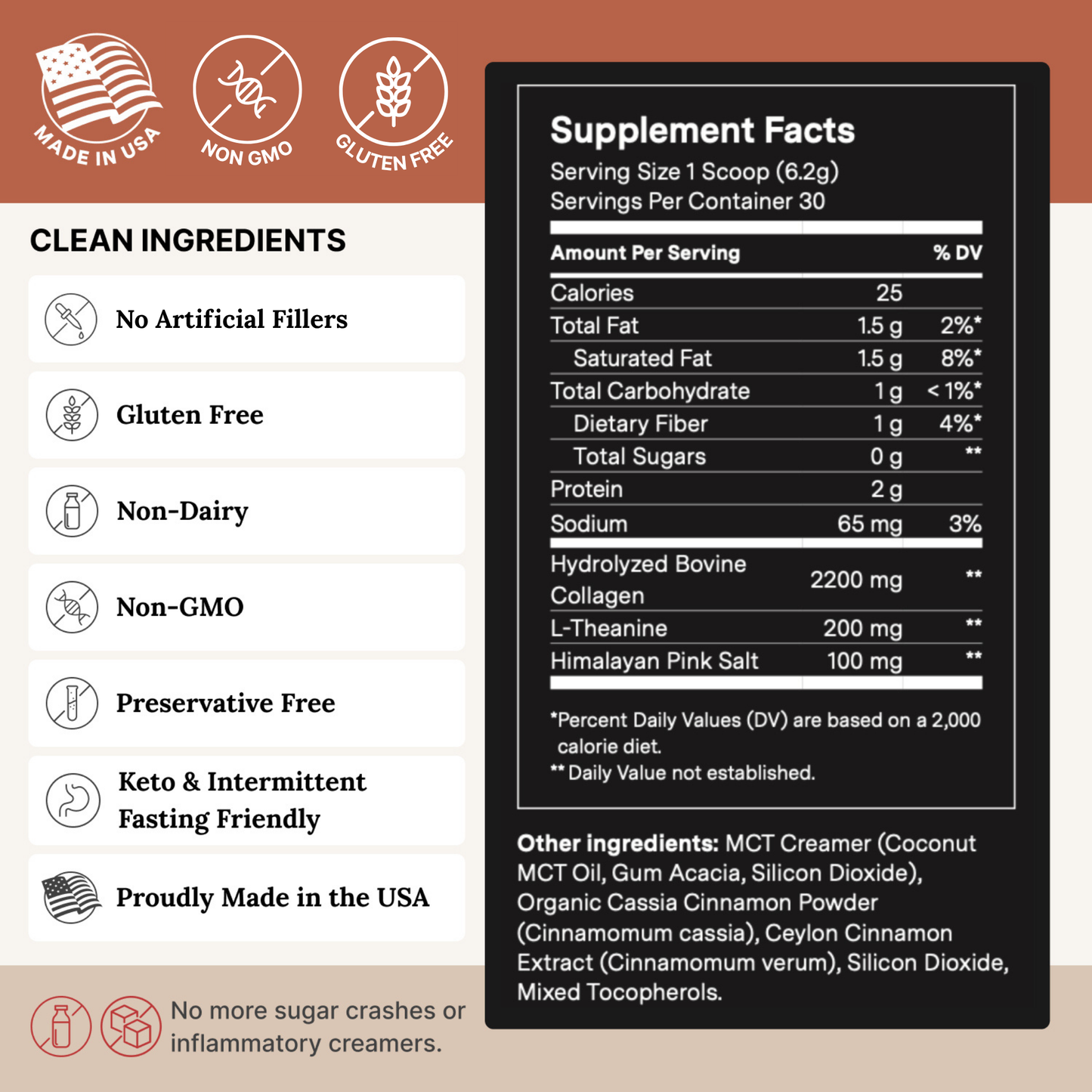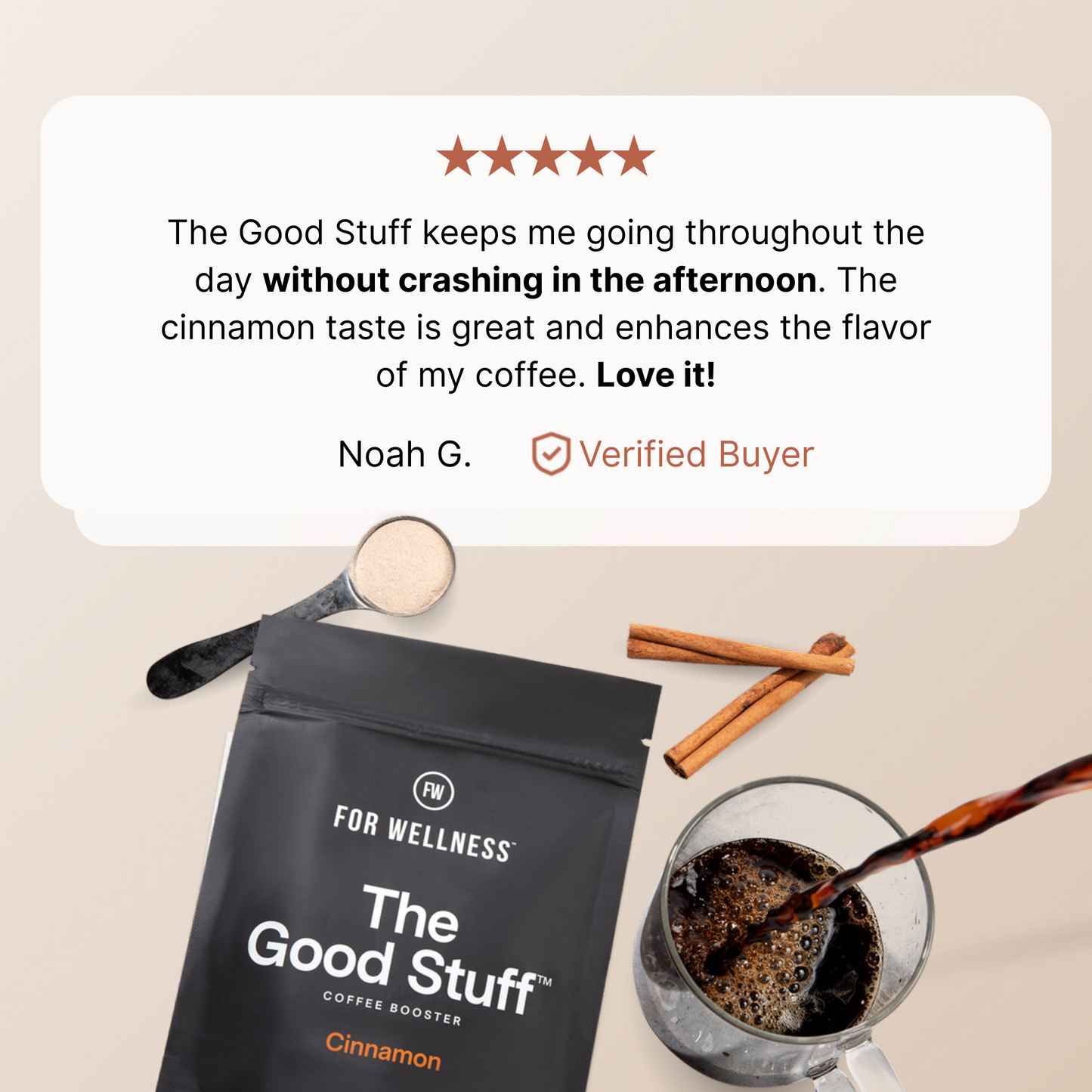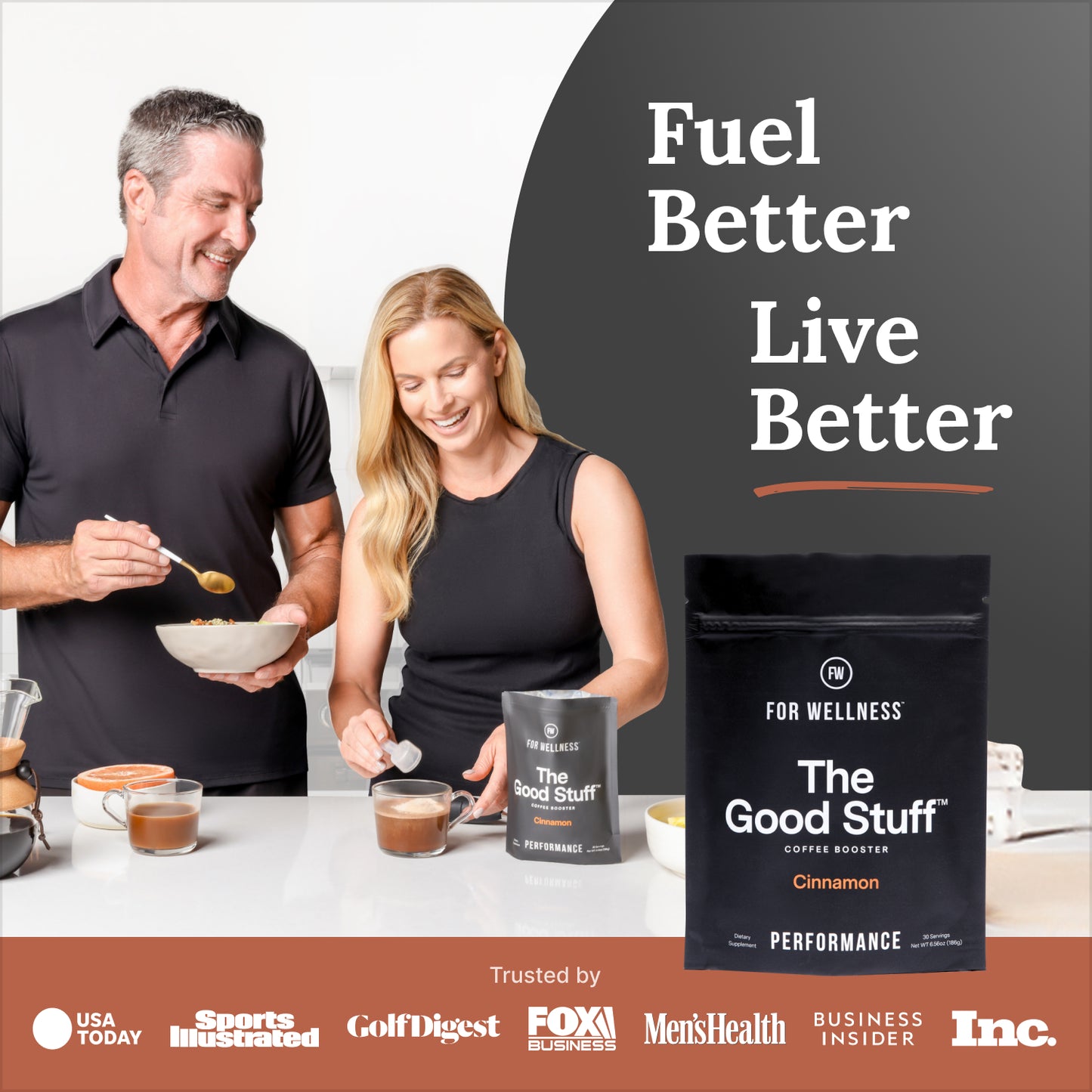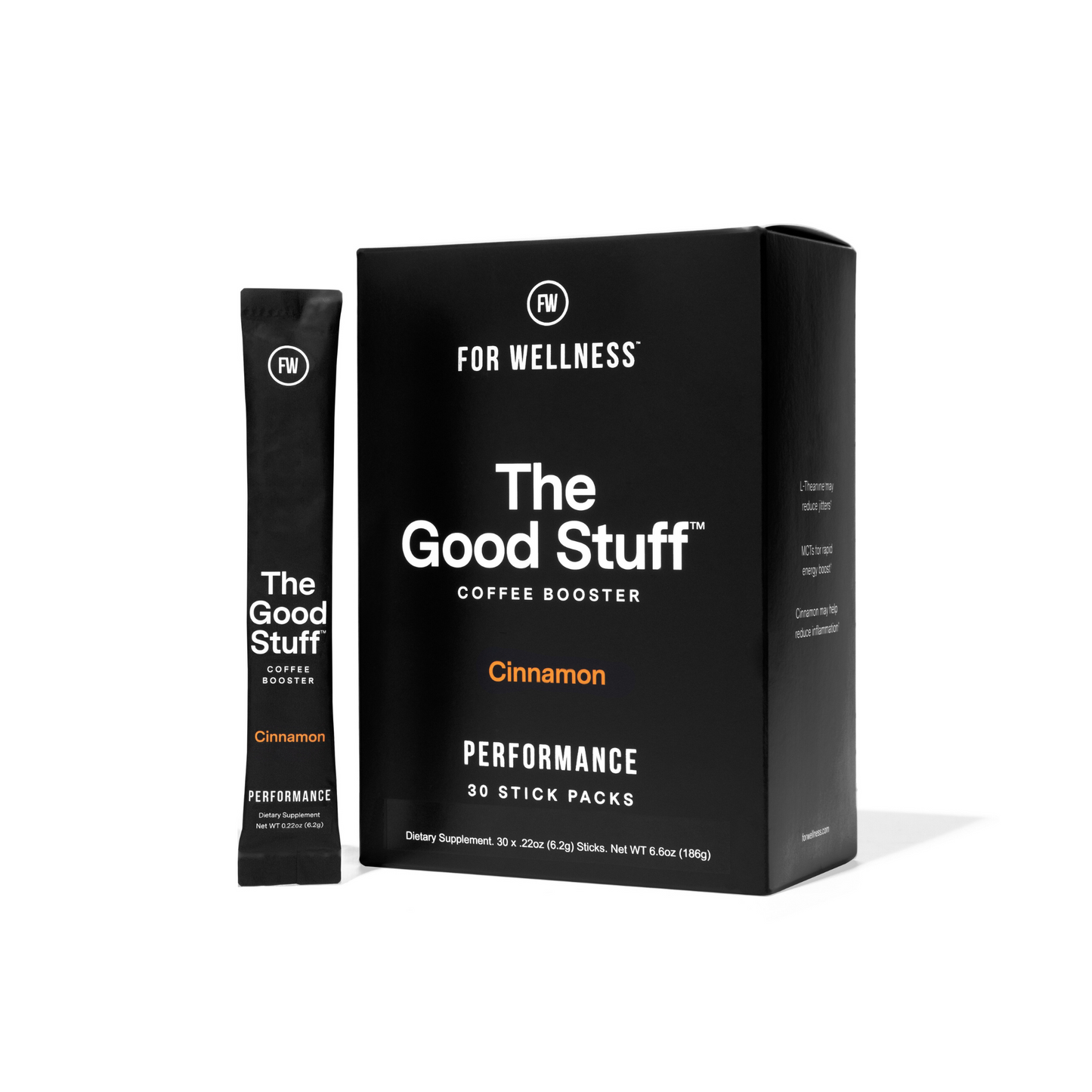According to one survey, nearly 80% of Americans drink their coffee with some sort of add-in, such as creamer or sugar. If you haven't grown accustomed to drinking yours black yet, chances are you have a favorite grocery store treat you mix into your mug every morning.
While coffee creamer might enhance the flavor of your cup of joe, have you ever stopped to think about what's in it? Behind names like "toasted coconut" and "french vanilla," you'll find a bevy of ingredients you probably didn't know you were consuming.
Today, we're lifting the lid on why traditional creamer isn't ideal - but fear not! We've found a delicious alternative you should consider.


The Good Stuff - Performance
-
One scoop will infuse your coffee with healthy ingredients
-
Ditch the bad stuff like sugar, dairy, and artificial creamers
-
Fights inflammation and supports skin and joint health
-
Makes your coffee taste great
What Is Coffee Creamer?
It might have its own spot in your fridge or a special shelf in your pantry. You reach for it half-awake, pouring it in until your coffee turns the shade you prefer.
For many people, artificial creamer is essential to their daily routine. It might be a mindless habit, but let's break down what it really entails.
In short, creamer is a dry powder or liquid designed to be poured into your coffee or tea. It takes the place of conventional milk products, such as heavy cream or half-and-half. Many people use creamer to make their coffee taste less acidic and give it a pleasantly sweet flavor.
The most common varieties include:
- Liquid
- Powdered
- Flavored
- Fat-free
- Sugar-free
Despite its name, most coffee creamer doesn't contain any dairy. Instead, it's made mostly from sugar (or a sugar substitute) as well as oils and thickeners. Though it has a similar texture to half-and-half, the ingredients are very different.
Half-and-half contains equal parts whole milk and cream. In addition to stirring it into your coffee, you can use it in desserts and other dishes that call for its creamy sweetness. On the other hand, creamer is solely used to sweeten hot beverages.
The absence of dairy explains why it has a longer shelf life than the gallon of milk in your fridge and can last even longer in dry, powdered form. While it's understandably convenient, creamer might not be as good for you as you think. Let's break down the basics.
What's In It?
There are lots of different kinds of coffee creamers. Some are seasonally flavored, such as pumpkin spice. Some are made with almond, soy, or oat "milk" alternatives. Even if you don't prefer flavored coffee, it's usually easy to find some variety that pleases your palate.
The only problem? Those extra flavors mask what you're really pouring. Let's peel back some of the most common coffee creamer ingredients to discover what it contains.
Thickening Agents and Emulsifiers
Despite the name, most store-bought creamers don't actually contain any heavy cream. Still, they need to be creamy and pourable. To remedy this, manufacturers use a blend of different thickening agents and emulsifiers.
One of the most commonly used thickeners is carrageenan. Added to foods since the 1950s, its sole purpose is to make them thicker, though it contains no nutritional value. While it might get the job done, there is a cost to consider.
Carrageenan is can promote or cause a variety of health ailments, such as:
- Inflammation
- Digestive issues
- Bloating
- Irritable bowel syndrome
- Food allergies
- Glucose intolerance
- Colon cancer
If you've ever felt a little sick to your stomach after downing a few cups of coffee, your creamer could be to blame. In addition to carrageenan, other thickening agents often found in creamer include:
- Cellulose gum
- Cellulose gel
- Polysorbate 60
Cellulose gum and gel are made from the cell walls of plants, including wood pulp and cottonseed. The fiber they contain works as a filler, helping you feel full even though you haven't consumed any nutrients. For this reason, cellulose gum is often used in diet products.
Polysorbate 60 is a type of emulsifier derived from sugar alcohol. It's an oily liquid used in cosmetics to keep essential oils from separating in a water-based product. Does that sound like something you should be consuming daily?
Preservatives
Next, let's talk about the preservatives in your liquid or powdered coffee creamers. If you were to buy a carton of whole milk, it would last around a week in your fridge. After that, you'd notice a putrid smell every time you unscrewed the lid.
Why, then, does your creamer seems to last so much longer?
The answer lies in the chemicals within, many of which are designed to help your creamer last as long as possible. You're unlikely to finish a large bottle of creamer in a week, so manufacturers get creatives with their add-ins.
Most preservatives are designed to inhibit mold from growing within the container and spoiling the product. Common ones include:
- Dipotassium phosphate
- Sodium stearoyl lactylate
Often added to food and cosmetics, dipotassium phosphate is an artificial salt made from sodium and phosphorus. On its own, it looks like a white, grainy powder. Its levels are usually low, and there aren't many health risks. However, it can be of concern if you suffer from kidney disease, which can inhibit your body's ability to rid itself of excess levels of phosphorous.
If phosphorous builds up in your system, it can weaken your bones. It can also create calcium deposits that enhance your risk of heart disease, joint pain, and vein problems.
Sodium stearoyl lactylate is a white or yellow powder made from acid-derived sodium salts. In addition to food, you'll also find it in a variety of personal care and cosmetic products, including:
- Moisturizer
- Sunscreen
- Conditioner
- Body wash
The same chemical that preserves those items is also in your mug. While the health risks of these preservatives might be low, there's still no need to consume them when there are healthier ways to enhance your coffee.
Artificial Flavors
Ah, pumpkin spice season. It's so popular it even has its own hashtag (#PSL).
If you look forward every year to the peppermint mocha, gingerbread, and eggnog creamer varieties that fill your local store, you know that creamer can take on many different flavors! In addition, there are all of the year-round flavors that you can depend on, such as sweet cream, caramel, and vanilla.
You might love waking up to your favorite aroma wafting across the kitchen, but here's the hard truth: While some of those flavors might be derived from natural sources, most are 100% artificial.
That's right: The tantalizing smell of hazelnuts you're enjoying didn't likely come from freshly cracked hazelnuts roasting over a fire. Instead, it was made in a lab.
The more you consume artificially-flavored food, the more your taste buds crave it. In comparison, non-flavored foods can taste pretty bland. Without adding some type of flavoring, the emulsifiers and thickeners we discussed wouldn't have any taste.
However, while you might enjoy the taste of those flavors, they aren't great for you. Some of the health risks associated with consuming artificial flavors include:
- Allergic reactions
- Food hypersensitivity
- Abdominal pain
- Digestive issues
- Aggravation of asthmatic symptoms
Thankfully, this doesn't mean you have to settle for tasteless coffee. There are supplements designed to supercharge the natural benefits of your coffee instead of making it bad for you. More on this later.
Artificial Sweeteners
Since we're already talking about artificial extras, let's discuss sweeteners next. As we mentioned, the various thickeners in your favorite creamer don't have a naturally sweet taste. Yet, that's why most people reach for their beloved bottle in the first place!
To enhance the flavor of their products without adding a ton of extra sugar or calories, manufacturers turn to artificial sweeteners, such as sucralose. This product might not contain any calories, but it's also devoid of nutrition.
About 600 times sweeter than sugar, there's no doubt that sucralose gets the job done. A tiny amount goes a very long way. Yet, there's a downside to consuming even a tiny quantity of it.
Studies show that sucralose can dramatically alter your gut biome, cutting the number of good bacteria by up to half. It can also increase inflammation throughout your body and can cause your blood sugar to spike. Over time, these issues can increase your risk of developing several health problems, including obesity and type 2 diabetes.
Hydrogenated Oils
Thickeners and emulsifiers can go a long way, albeit at the sake of your health. However, even these ingredients can't make your favorite creamer as luxuriously thick as you'd like.
That's why even the top brands have to also add hydrogenated oils. In addition to adding texture, they do this to:
- Extend shelf life
- Thicken products
- Increase stability
- Cut costs
Hydrogenated oils contain primarily saturated fat, which can raise your LDL (low-density lipoprotein) levels, causing cholesterol to build up in your arteries and increasing your risk of heart disease.
The American Heart Association (AHA) recommends that you only obtain 5% to 6% of your total calories from saturated fat. That means if you consume 2,000 calories each day, only 120 of them (roughly 13 grams) should come from saturated fat.
What About Sugar-Free or Fat-Free Creamers?
If you've made it this far, you might be patting yourself on the back. Your favorite creamer doesn't contain any of this junk because it's fat-free! Or, maybe it's sugar-free but still, somehow, suspiciously sweet.
Before you celebrate, let's back up a little.
Most of these creamers have to find some way to make up for their ingredients' lack of flavor and taste. As a result, they turn to additional chemicals, including artificial sweeteners such as maltodextrin.
Though it's been declared safe by the FDA, scientists have found that maltodextrin can alter your gut bacteria. This can lead to various digestive health issues, including inflammatory bowel disease (IBD). Other possible side effects include:
- Weight gain
- Bloating
- Allergic reactions
Is There an Alternative to Coffee Creamer?
Now that we've gone into all the details about why you shouldn't dose your coffee with creamer, let's discuss what you can do to make it taste great without sacrificing your health.
If you're looking for a way to enhance the flavor of your coffee and enjoy a powerful health boost, start with our performance coffee supplement, The Good Stuff™.
This easy-to-use powder blends beautifully into your beverage, supercharging all of its natural benefits while promoting overall health. With just one scoop, you'll enjoy better focus, a calmer mood, and more mental clarity without the sugar-crazed jitters you usually get from your morning brew.
How does it work? The secret lies in our incredible blend of ingredients, none of which are made in a lab or impossible to pronounce. Our star players include:
- Medium-chain triglyceride (MCT)
- Ceylon cinnamon
- L-Theanine
- Collagen
- Himalayan pink salt
Let's break these down a little more.
Medium-Chain Triglyceride (MCT)
Unlike the fats found in hydrogenated oil, MCT is a healthy fat found in coconut oil. The most ketogenic form of MCT is known as C8.
This type of MCT is easy to digest and serves as an excellent source of energy. Not only does it help you feel fuller for a longer period of time, but it also helps you feel more alert and optimizes your focus, concentration, and clarity!
Ceylon Cinnamon
Ceylon cinnamon is a type of cinnamon made from the bark of evergreen cinnamon trees. It contains an impressive array of vitamins, minerals, and antioxidants that can help:
- Reduce inflammation
- Lower cholesterol levels
- Improve insulin response
- Lower your risk of health conditions, including cancer, heart disease, and diabetes
Ceylon cinnamon also has powerful antioxidant and antimicrobial effects, which help keep your immune system healthy and strong. It helps your body handle all of the free radicals it encounters and is rich in manganese, which facilitates bone repair.
Finally, it tastes delicious - especially when you add it to coffee.
L-Theanine
L-Theanine is a type of amino acid found in green tea. Long heralded as a health food superstar, green tea is one of the most anti-inflammatory and antioxidant-rich beverages. Much of its potency is attributed to L-Theanine.
We added it to The Good Stuff™ because it supercharges the health benefits of your coffee without adding any extra caffeine. That means you won't feel as jittery or anxious after enjoying your brew.
Instead, L-Theanine works to boost the calming chemicals in your brain. You'll find that you feel more peaceful, relaxed, and ready to take on the day.
Collagen
Collagen has become a buzzword of late, added to everything from smoothies to cookies. That's because the world has realized what scientists have always known: It's a primary building block for your body and essential to vitality and longevity. In fact, collagen accounts for 30% of the total protein in your body!
Collagen is one of the main components in your bones, skin, muscles, and hair. It helps to make your body tissues strong, flexible, and resilient, so they're less likely to break. That's why it's closely associated with skin elasticity and joint health.
While some foods naturally contain collagen, including fish, poultry, meat, and eggs, many people take it in supplemental form. A regular intake of collagen can improve joint mobility and reduce inflammation. It can also optimize the look and structure of your skin, hair, and nails.
Himalayan Pink Salt
You've heard of adding milk and honey to your coffee, but salt? Hear us out.
We added Himalayan Pink Salt to Himalayan Pink Salt to The Good Stuff™ for two main reasons. First, it naturally reduces the acidity of your coffee, which smoothes out the flavor and helps it taste less bitter. Second, it also helps maintain a proper fluid balance, keeping you hydrated all day long.
Coffee can be naturally dehydrating, so this extra hydration boost is just what you need! On the outside, you'll notice that it's a skin-smoothing ingredient. Inside, it works hard to quench your muscles and prevent cramping.
What's Not Included?
The above ingredients help make The Good Stuff™ an easy choice when you're looking for something tasty and nutritious to add to your coffee.
While that's what's in our product, here's what you won't find:
- Artificial colors
- Artificial sweeteners
- Artificial flavors
- Gluten
- Genetically-modified organisms (GMOs)
- Preservatives
In other words, all the gunk in a typical bottle of creamer!
We pride ourselves on the premium, top-quality ingredients in our coffee supplement. Everyone can benefit from a scoop, including professional athletes who need to be at peak performance but don't want to eliminate their favorite coffee habit from their daily routine.
What About the Taste?
You reach for coffee creamer to help your coffee taste, well, less like coffee and more like the flavor listed on the bottle. Why, then, should you trust The Good Stuff™, especially if it contains no extra sweeteners or chemicals?
You'll find that with just one scoop, you don't need any of the creamers or add-ins that you've come to rely on. Instead, this supplement gently and effectively enhances and smoothes out the natural flavor of your coffee. The prominent flavor will be the brew, but with a delicate hint of cinnamon and a dash of Himalayan salt to soften the acidity.
If you want it just a little sweeter, don't reach for the sugar, and by all means, steer clear of the creamer! Instead, a teaspoon of natural Manuka honey should do the trick.
For an even greater health boost, pair The Good Stuff™ with our Antioxidant Coffee! Specially roasted to maintain high levels of naturally occurring antioxidants, it's the ideal way to enjoy your coffee habit while also promoting your overall wellness.
Ditch the Coffee Creamer and Try the Good Stuff
We'll give you time to run to the kitchen and toss your bottle of coffee creamer in the trash. Artificial sweeteners, preservatives, and chemicals aren't the only way to enhance your brew's flavor and get that much-needed java boost.
With The Good Stuff™, you can rest assured your coffee will taste great and be good for you. We've left out all of the bad stuff and choked it full of the antioxidants, vitamins, and minerals your body needs to be at peak performance.

